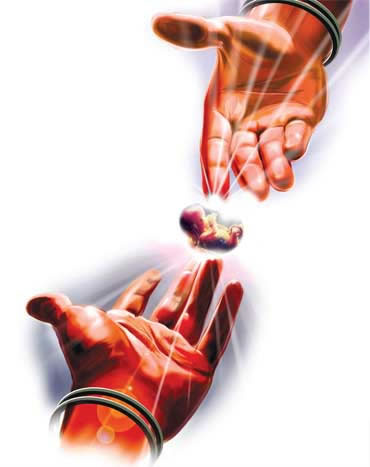Couples catch’em younger than Babies
- Home
- News & Media
- Couples catch’em younger than Babies

Radha, who became a mother of twins a few months ago, did not tell her family about a novel medical procedure, she and her husband tried to conceive children. They, like many childless couples in their late thirties and into their fifties, tried embryo adoption.
In this, a developed embryo from different, anonymous donor is transferred into the recipient’s uterus. Friends and family are left to believe that the child is naturally conceived by the couple, thus avoiding the social stigma associated with adoption. “No one knows about this apart from me, my husband and the doctor,” says Radha.
Dr. Aviva Pinto Rodrigues, a fertility consultant, explains, “In India where there is so much social stigma associated with infertility, this method of adoption gives the couple a chance to carry the baby. So, nobody will know that it is not their own child. Also, couples believe that by carrying the baby, they will have an emotional bond with it.”
Older couples opt for embryo adoption, says Dr Aviva, because the younger ones “have time and they usually want the baby to have genetic ties with them.” The risks around pregnancy increase after women cross their 49th year. People with lifestyle diseases such as diabetes and blood pressure are also discouraged by the centres.
Radha says that she was confused initially. “I was not sure what embryo adoption meant,” she says, “but after consulting the doctor, I was hopeful and happy to go forward with the procedure.” Radha says that she “enjoyed the phase” because there had been many failures before.
Unfortunately, the success rates of embryo donations aren’t very promising -- 40% fail to get pregnant in their first attempt. The doctors advise couples to try again. “They should check if the embryos are good,” says Dr. Kamini Rao, the medical director od Milann the fertility center. “They usually are, so they should then go through tests, find out why they cannot conceive.” These tests will cost about `40,000.
The procedure does not come cheap, costing a little more than a lakh for every attempt. The couple also has to pay to test the donor’s embryo. The centers usually screen the embryos for infectitous diseases such as hepatitis, HIV and syphilis.
“Screening genetic diseases cost more which we can’t cover for every embryo, but we do test the donors and have their family history. The donors usually already have conceived a child,” says Dr. Aviva.
Priya Darshini, a clinical psychologist who counsels parents who opt for this adoption, says, “They ask me for the donor’s name but I can’t share that with them because it would be illegal. Their other worry is if the baby will look like them. The baby will not because it is not genetically related to them. So, we mentally prepare them for the future,” says Darshini. There have been few cases where the parents couldn’t deal with having a baby carrying someone else’s genes. Darshini adds, “There have been times when we had to refer patients to psychitrists because they go into depression.”
Reality Check
Many college students sell their gametes (or eggs or sperm) to make a quick buck. They get paid anything between Rs 35,000 and Rs 50,000 for every donation made. But, in India, it is illegal to sell your ova or sperm if you are younger than 21 years. City Express tried to find out how many donor agencies, which connect donors to hospitals and fertility clinics, bend the rules.
